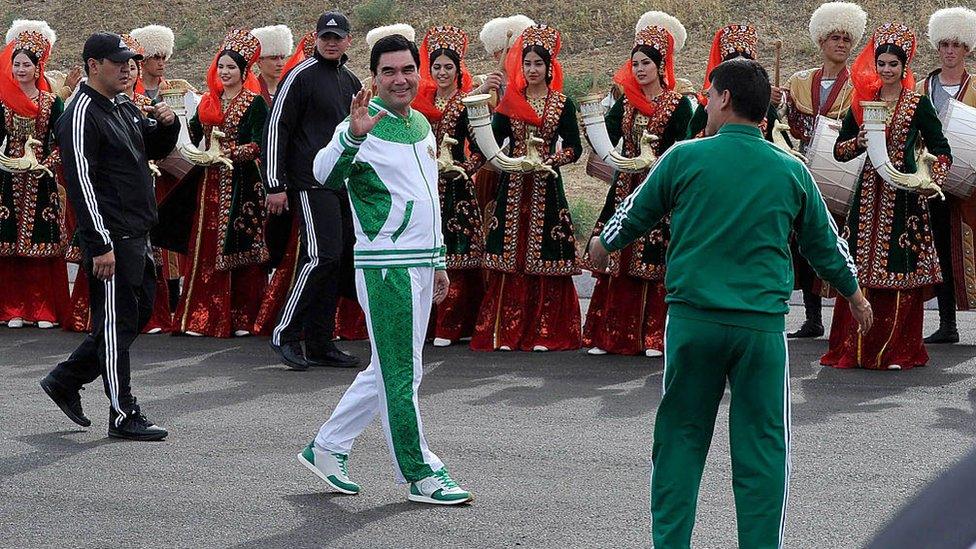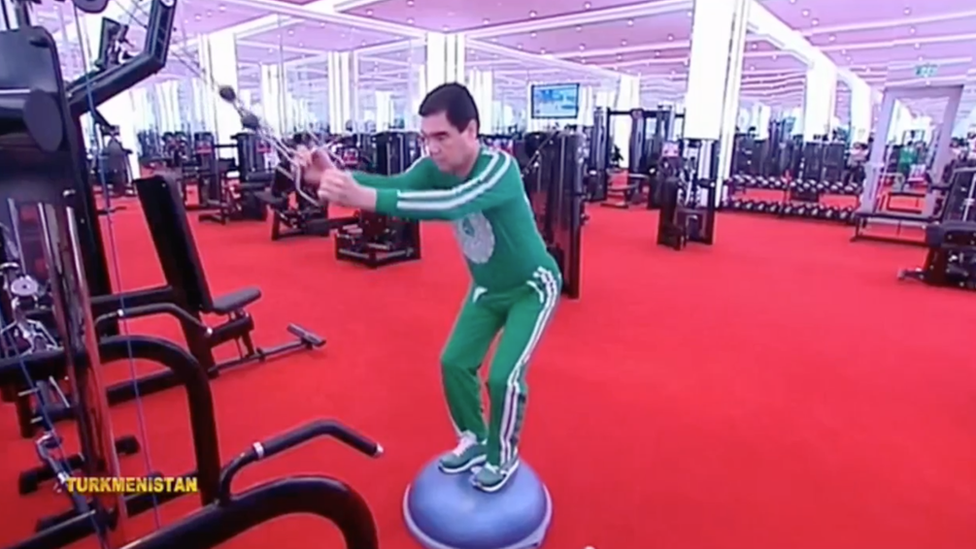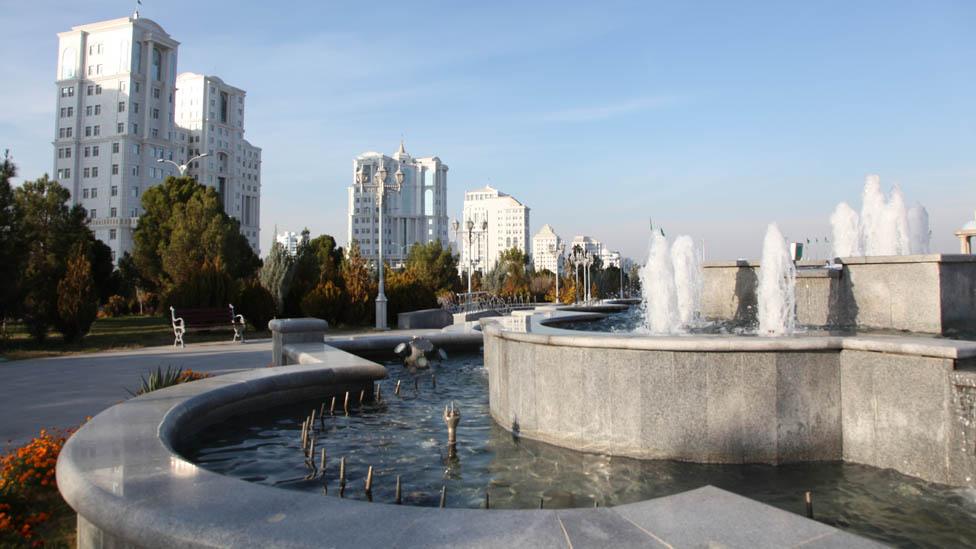Turkmenistan: The regime that throws cigarettes on bonfires
- Published
Is Turkmenistan's anti-smoking campaign a sign of political good health?
One of the most repressive states in the world is trying to become one of the healthiest. Turkmenistan is promoting fitness and wants to become a smoking-free nation - but when no-one can openly challenge the government's decisions, how healthy can such a campaign be, asks Abdujalil Abdurasulov.
An old Turkmen with a long white beard picked a carton of cigarettes from a pile taller than he was. His traditional quilted blue dressing gown and a black fur hat contrasted with the suits and ties the assembled state officials were wearing.
The old man threw the cigarettes into a flaming furnace, where the blaze devoured them. A black column of smoke belched from a chimney. Others followed him and tossed cigarettes into the fire with enthusiasm.
This destruction of illegally imported tobacco products was recently shown on Turkmen state TV as part of an anti-smoking campaign.
An elderly woman spoke on camera: "During the happiness era of our stable country, the respected president does a lot to create a healthy society." She kept thanking the president, Gurbanguly Berdymukhamedov.
This man leads one of the most repressive states in the world. He tolerates no dissent. The human rights record in Turkmenistan under his leadership remains one of the worst of the worst.
A dentist by education, Berdymukhamedov has made health part of his cult of personality. And he is the main focus of the campaign promoting a healthy lifestyle. He cycles in rallies where no-one dares to overtake him. He squats with weights in an empty gym.

Berdymukhamedov at the opening ceremony of a 500-day nationwide horse race
"Thank God, he was a dentist!" one Turkmen citizen once told me. Her delight is understandable. Berdymukhamedov's predecessor, who called himself Turkmenbashi - the Father of all Turkmen - built statues to himself, banned opera and even shut down hospitals.
Now Turkmenistan wants to be a tobacco-free nation, a mission highly praised by the World Health Organization. The president has even received an award for reducing the level of smoking in the country.
The photo of him smiling and holding a certificate and a medal, standing next to the head of the WHO, makes Turkmenistan look like a country that follows international standards. With his bushy eyebrows and dark gleaming eyes, the president seems to be shouting: "Look, the international community recognised our achievements!"
This is the message he wants to spread. He doesn't want the world to scrutinise Turkmenistan's human rights abuses. He doesn't want to be questioned about government critics who have disappeared in prisons. He doesn't want to discuss why the Turkmen president can serve for life.

President Berdymukhamedov shown on state television in a gym
"Health and Happiness" is one of the main slogans of this campaign. If you're not happy, then you must keep quiet.
Using a messaging app, I managed to chat to a Turkmen living in the capital, Ashgabat, about the health system.
A bubble with his comment popped up on my phone: "If you want to be treated well in hospitals, you must pay bribes." This is a common knowledge but no-one can complain about it.
Fear is a big part of how the president rules. It felt eerie when I walked along the wide and deserted streets of the capital, Ashgabat. Desperately searching for a single living soul, I passed marble buildings surrounded by beautiful fountains.

The city felt abandoned and yet I was clearly being watched. When I took my camera out, a man with a walkie-talkie appeared, it seemed from nowhere. He shouted something, waving at me to go. I had to obey.
During "the month of health" earlier this year, state employees conducted morning exercises in public. State TV showed rows of librarians in long traditional Turkmen dresses stretching their backs.
Workers in cotton plants and the gas industry, employees of the parliament and the ministries - all were involved.
Were they forced to do this?

Find out more
From Our Own Correspondent has insight and analysis from BBC journalists, correspondents and writers from around the world
Listen on iPlayer, get the podcast or listen on the BBC World Service or on Radio 4 on Thursdays at 11:00 BST and Saturdays at 11:30 BST

President Berdymukhamedov is a big fan of horse racing, and occasionally takes part. During once race several years ago, his horse stumbled and the president crashed to the ground.
For some time he lay motionless. People rushed to the scene.
But men in black stood up to block the cameras. "Stop filming!" a man said in a low voice, waving his race card in front of the lenses. "Don't film, we may have problems," one reporter muttered to her colleague.
Security guards searched everyone leaving the race track and erased their recordings.
The TV news simply cut out the president's fall, of course. Just as this campaign to promote a healthy life style cuts out all ugly bits of Turkmenistan's reality.

Join the conversation - find us on Facebook, external, Instagram, external, Snapchat , externaland Twitter, external.